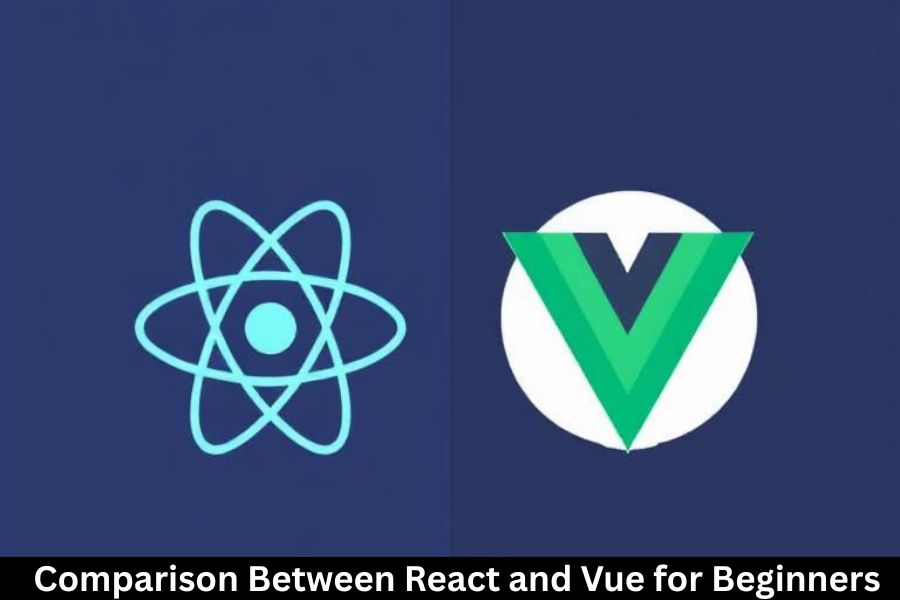When it comes to building modern web applications, two JavaScript frameworks dominate the conversation — React and Vue. Both are loved by developers for their flexibility, speed, and ability to build dynamic user interfaces. But if you’re just starting your journey in web development, choosing between the two can feel overwhelming.
Let’s break down the differences, similarities, and beginner-friendly aspects of React and Vue to help you decide which one fits your goals best.
1. Understanding the Basics
Before diving deep, let’s understand what each framework does.
What is React?
React, developed by Facebook (now Meta), is a JavaScript library for building user interfaces. It focuses on reusable components and a one-way data flow, making it highly efficient and scalable.
What is Vue?
Vue.js, created by Evan You, is a progressive JavaScript framework designed for simplicity and flexibility. It combines the best parts of Angular and React while remaining lightweight and easy to learn.
2. Popularity and Community Support
React’s Global Dominance
React enjoys massive adoption across industries. It’s used by tech giants like Netflix, Airbnb, and Instagram, supported by a large ecosystem and continuous updates.
Vue’s Rapid Growth
Vue might not have React’s market share, but it’s rising fast—especially among startups and independent developers. Its community is smaller but extremely passionate and beginner-friendly.
3. Learning Curve
React: Moderate Learning Curve
React’s syntax introduces JSX, a blend of JavaScript and HTML, which might confuse beginners initially. However, once you grasp it, building reusable components becomes second nature.
Vue: Beginner-Friendly
Vue feels intuitive. You can start writing Vue apps using just HTML, CSS, and JavaScript, which makes it perfect for beginners transitioning into frameworks.
4. Syntax and Structure
React Syntax Example
function Welcome() {
return <h1>Hello, React!</h1>;
}
React’s syntax blends HTML and JavaScript in a single file (JSX), which allows for powerful dynamic rendering.
Vue Syntax Example
<template>
<h1>Hello, Vue!</h1>
</template>
<script>
export default {
name: 'Welcome'
}
</script>
Vue separates HTML, CSS, and JavaScript into sections, which feels natural for newcomers used to traditional web development.
5. Performance and Speed
Both React and Vue deliver lightning-fast performance.
- React: Uses a Virtual DOM to minimize direct manipulation of the real DOM.
- Vue: Also uses a Virtual DOM, but with additional optimizations that automatically detect dependencies.
In most cases, performance differences are negligible for typical web apps.
6. Flexibility and Ecosystem
React
React is more like a “toolbox.” You can choose libraries for routing, state management (like Redux or Zustand), and more. It gives freedom but requires more setup decisions.
Vue
Vue comes with more built-in features out of the box, such as Vue Router and Vuex for state management—great for beginners who want an all-in-one framework.
7. State Management
- React: Uses hooks (
useState,useReducer) or external libraries like Redux, MobX, or Recoil for advanced state management. - Vue: Offers reactive data properties and computed properties natively, simplifying how you handle and track data changes.
8. Scalability
- React: Ideal for large-scale applications thanks to its modular architecture and strong ecosystem.
- Vue: Also scalable, but React’s corporate backing gives it an edge for enterprise-level systems.
9. Integration with Existing Projects
Vue can be easily dropped into any existing web project using a simple <script> tag. React, while also flexible, often requires a build setup with tools like Webpack or Vite.
10. Developer Experience
- React: More configuration needed, but highly customizable.
- Vue: Developer experience is smoother out of the box, with fewer steps before you can start coding.
11. Documentation and Learning Resources
Vue’s documentation is often praised for being clear, detailed, and example-driven—perfect for self-learners.
React’s documentation is comprehensive but more technical, assuming a bit more background knowledge.
12. Use Cases
- React: Great for complex UIs, dashboards, SPAs, and cross-platform apps (via React Native).
- Vue: Ideal for lightweight apps, quick prototypes, or integrating interactivity into existing projects.
13. Job Opportunities and Market Demand
React dominates the job market, with more openings worldwide due to its enterprise adoption.
Vue jobs are growing rapidly, especially among startups and creative agencies that value speed and simplicity.
14. Community Tools and Ecosystem
- React Tools: React Developer Tools, Next.js (for SSR), Create React App.
- Vue Tools: Vue CLI, Nuxt.js, Vue DevTools.
Both ecosystems are strong, but React’s breadth of third-party tools is unmatched.
15. Future Outlook
React’s development continues under Meta with consistent updates and innovations like React Server Components.
Vue’s future is equally bright, with Vue 3 introducing Composition API, better TypeScript support, and improved performance.
16. Side-by-Side Comparison Table
| Feature | React | Vue |
|---|---|---|
| Creator | Facebook (Meta) | Evan You |
| Type | JavaScript Library | JavaScript Framework |
| Language | JSX (JavaScript + XML) | HTML Templates + JS |
| Learning Curve | Moderate | Easy |
| Performance | Excellent | Excellent |
| Ecosystem | Vast (Many Libraries) | Compact (Built-in Tools) |
| Best For | Large-scale apps | Beginners & Prototypes |
| State Management | Redux / Hooks | Vuex / Reactive Data |
| Community Support | Huge | Growing |
| Job Demand | High | Medium-High |
17. Which Should Beginners Choose?
If you’re new to front-end development:
- Choose Vue if you want a gentle learning curve, minimal setup, and a straightforward path to productivity.
- Choose React if you’re aiming for long-term career opportunities, scalability, and advanced web app development.
In short — Vue is easier to start, React is better to grow.
Conclusion – The Verdict
Both React and Vue are modern, fast, and developer-friendly tools. For beginners, Vue offers simplicity and instant results, while React offers career growth and flexibility for larger, more complex projects.
Whichever you choose, remember: mastering the fundamentals of JavaScript is what truly makes you a great developer. Frameworks come and go, but a strong foundation will keep you ahead of the curve.
FAQs
Q1. Which framework is faster — React or Vue?
Both are extremely fast, but Vue has slightly better performance for smaller projects due to its lightweight structure.
Q2. Is Vue easier to learn than React?
Yes, Vue is generally considered more beginner-friendly, especially for those familiar with HTML and JavaScript.
Q3. Can I learn both React and Vue?
Absolutely! Learning one helps you understand the other. Once you grasp component-based architecture, switching becomes easy.
Q4. Which one has better community support?
React currently has a larger community and job market, but Vue’s user base is growing rapidly.
Q5. Which framework is better for startups?
Vue is often preferred by startups for its simplicity, faster setup, and lower development overhead.



